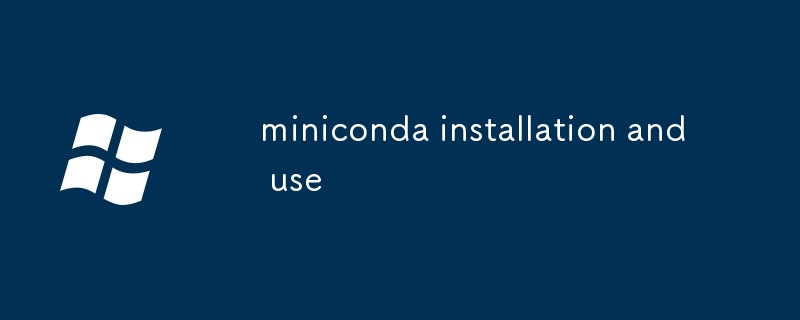miniconda installation and use
Aug 14, 2024 pm 03:36 PMThis article provides detailed instructions on installing Miniconda on different operating systems, including Mac OS, Windows, and Linux. It also explains the differences between conda and pip, two commonly used package managers, and provides guideli

How to install Miniconda on different operating systems?
To install Miniconda on different operating systems, follow these steps:
-
Mac OS
- Download the Miniconda installer from the Miniconda website (https://docs.conda.io/en/latest/miniconda.html#miniconda-installer)
- Double-click on the installer file to launch the installation wizard
- Follow the on-screen instructions to install Miniconda.
-
Windows
- Download the Miniconda installer from the Miniconda website (https://docs.conda.io/en/latest/miniconda.html#miniconda-installer)
- Run the installer file and follow the on-screen instructions to install Miniconda. Select the "Just Me" option during the installation.
-
Linux
- Open a terminal and run the following commands:
wget https://repo.continuum.io/miniconda/Miniconda3-latest-Linux-x86_64.sh bash Miniconda3-latest-Linux-x86_64.sh
What is the difference between conda and pip, and when should each be used?
- Conda is a package and environment manager used for installing and managing software packages and their dependencies. It can also create and manage virtual environments, allowing you to isolate different projects with their own sets of packages and dependencies. Conda is particularly useful when you need to install a specific version of a package or manage multiple versions of the same package.
- Pip is a package manager specifically designed for Python packages. It is used to install, upgrade, or remove Python packages from the Python Package Index (PyPI). Pip is typically used when you want to install or manage Python packages within a specific virtual environment or system-wide.
How can I create, activate, and manage different virtual environments using Miniconda?
To create a new virtual environment using Miniconda, use the following command:
conda create -n myenv python=3.8
This command will create a new virtual environment named "myenv" with Python version 3.8 installed. You can activate the virtual environment using the following command:
conda activate myenv
To deactivate the virtual environment and return to the base environment, use the following command:
conda deactivate
To manage virtual environments, you can use the following commands:
-
conda list: List all installed environmentsconda list: List all installed environments -
conda remove: Remove an environment conda update
conda remove: Remove an environmentconda update: Update an environment🎜🎜The above is the detailed content of miniconda installation and use. For more information, please follow other related articles on the PHP Chinese website!

Hot Article

Hot tools Tags

Hot Article

Hot Article Tags

Notepad++7.3.1
Easy-to-use and free code editor

SublimeText3 Chinese version
Chinese version, very easy to use

Zend Studio 13.0.1
Powerful PHP integrated development environment

Dreamweaver CS6
Visual web development tools

SublimeText3 Mac version
God-level code editing software (SublimeText3)

Hot Topics
 PowerToys Is the Ultimate Work From Home Companion App
Mar 03, 2025 am 10:07 AM
PowerToys Is the Ultimate Work From Home Companion App
Mar 03, 2025 am 10:07 AM
PowerToys Is the Ultimate Work From Home Companion App
 How to Find the Product Key for Windows 10
Mar 04, 2025 am 01:46 AM
How to Find the Product Key for Windows 10
Mar 04, 2025 am 01:46 AM
How to Find the Product Key for Windows 10
 How to Install Windows 11 23H2 on Unsupported PC
Mar 03, 2025 pm 12:55 PM
How to Install Windows 11 23H2 on Unsupported PC
Mar 03, 2025 pm 12:55 PM
How to Install Windows 11 23H2 on Unsupported PC
 Top 3 Windows 11 Gaming Features That Outshine Windows 10
Mar 16, 2025 am 12:17 AM
Top 3 Windows 11 Gaming Features That Outshine Windows 10
Mar 16, 2025 am 12:17 AM
Top 3 Windows 11 Gaming Features That Outshine Windows 10
 How to Change the Font and Layout of PowerShell Window
Mar 03, 2025 pm 01:03 PM
How to Change the Font and Layout of PowerShell Window
Mar 03, 2025 pm 01:03 PM
How to Change the Font and Layout of PowerShell Window
 Acer PD163Q Dual Portable Monitor Review: I Really Wanted to Love This
Mar 18, 2025 am 03:04 AM
Acer PD163Q Dual Portable Monitor Review: I Really Wanted to Love This
Mar 18, 2025 am 03:04 AM
Acer PD163Q Dual Portable Monitor Review: I Really Wanted to Love This
 Fix 'There Are Currently No Power Options Available' in Windows 11
Mar 03, 2025 pm 12:58 PM
Fix 'There Are Currently No Power Options Available' in Windows 11
Mar 03, 2025 pm 12:58 PM
Fix 'There Are Currently No Power Options Available' in Windows 11








